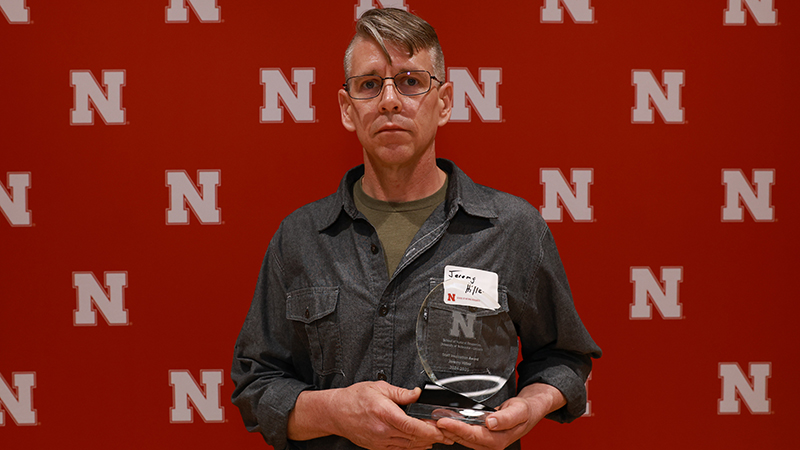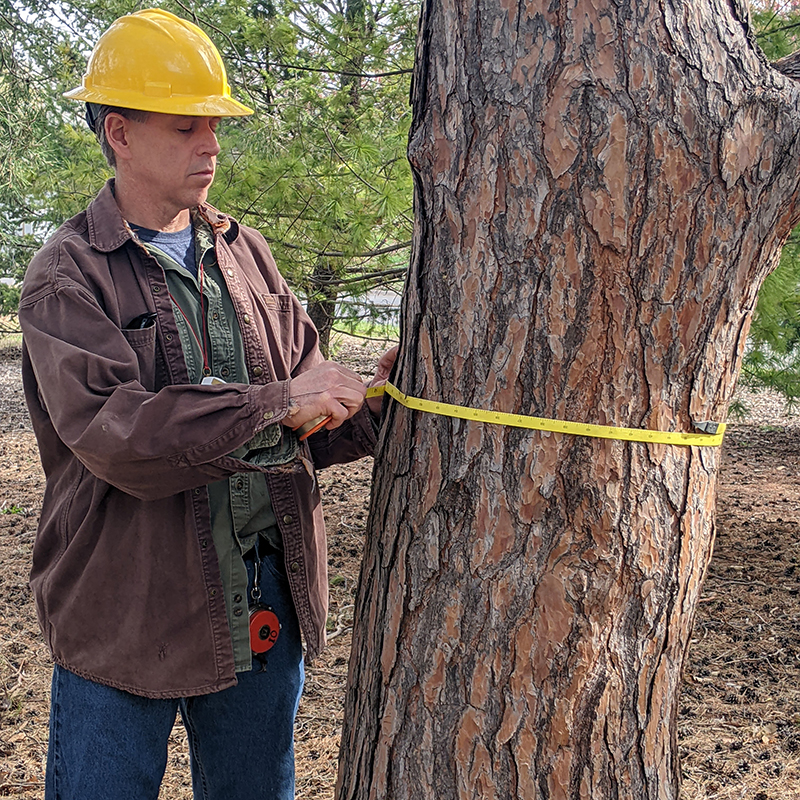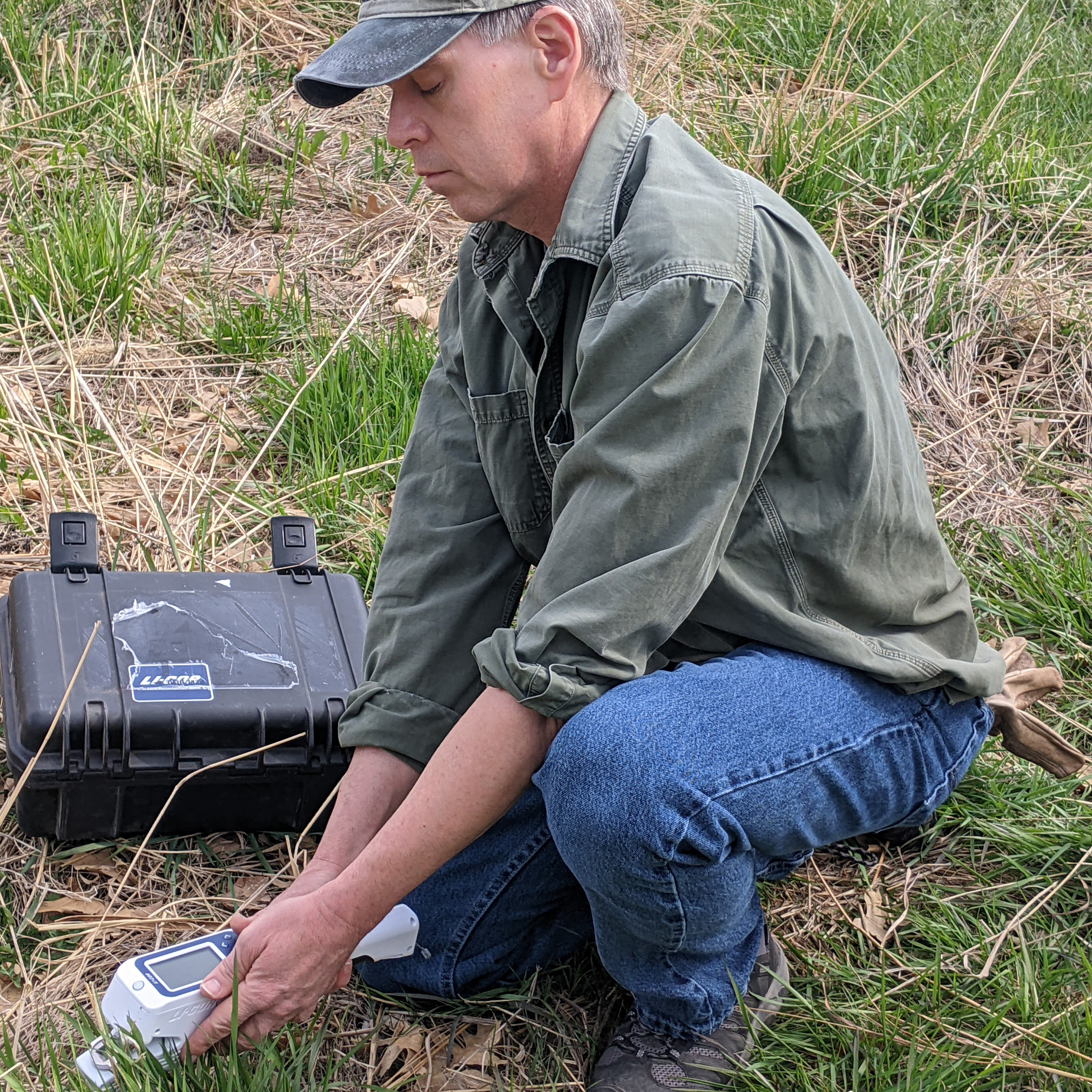Posted: 8/7/2025
Hiller receives two awards at 2025 SNR banquet

By Ronica Stromberg
Jeremy Hiller describes himself as "kind of a mystery" in the School of Natural Resources and says, "Nobody really knows who I am."
His coworkers beg to differ. They recently recognized him with two awards at the school's spring banquet, the Staff Inspiration Award and the Staff Recognition Award. Hiller had also won the Staff Recognition Award years ago. Students nominate staff for the inspiration award, and faculty, staff or students nominate staff for the recognition award.
Hiller has worked 25 years at the university as a research manager setting up and carrying out projects of professors, mainly Tala Awada, Dave Wedin and Jim Brandle. Although professors can hire graduate students to work on projects, students may leave a project after a couple of years. In contrast, Hiller can stay with projects many years and keep continuity in experiments.
Part of his position involves supervising one to three graduate students each year and four student workers from May to August in the field. He observes and measures plant growth, records data and analyzes trends.

His current supervisor, Awada, the associate dean in the Agricultural Research Division, said she saw Hiller as very deserving of both awards.
"Jeremy's leadership in the lab has been important to the implementation of our research, students' training and ensuring a safe laboratory environment, all of which have been key to the lab's overall success,” she said.
Hiller has four projects he's managing for her lab. He is examining the effects of a 2022 wildfire at the Nebraska National Forests and Grasslands and whether hand-planted trees or grassland will grow back. His other three projects are at the Eastern Nebraska Research, Extension and Education Center in Saunders County. There, he is looking at effects of fertilization techniques on smooth brome production in cattle grazing systems, effects of targeted fertilization techniques on field corn production and effects of eastern redcedars on soil microbiomes and nutrient cycling.
He said the variety in his job keeps it interesting and he finds work with graduate students particularly fulfilling.
"Helping these students figure out how to do their projects and then seeing them successfully start a professional career path and be successful there makes me feel like I had a positive contribution to their lives and to society in general, just because having decent, capable people doing jobs like this, I think, is very important," he said. "I've always felt that the university serves a very important purpose in creating competent people to go out and do these jobs."
Hiller earned his master's degree in agroforestry and forest ecology at the University of Nebraska–Lincoln. His graduate research focused on woody plant recruitment in agricultural windbreaks. He also earned his bachelor's degree at Nebraska, in environmental studies.

He came to the university from Bennet and, as a child, had helped out on his grandfather’s farm but had no interest in agriculture. In his teen years, he started walking along the Little Nemaha River and checking out the surrounding plants.
"I was just interested in why certain plants grew in certain places, or certain groups of plants grew in one area but not another area, and that really kind of sparked my interest in plant biology," he said.
His interest in agriculture developed when he started working for the School of Natural Resources at the research farm in Saunders County.
"I learned to appreciate agriculture and how hard it is and what you can accomplish with it whereas, when I was a kid, I really didn't have the experience to appreciate that," he said. "So, the university gave me that opportunity to develop an appreciation for agriculture."
In his free time these days, Hiller said he enjoys hiking river bluffs and trying to grow native plants like aster, ironweed, mint and purple coneflowers in his flowerbeds.
He said winning both School of Natural Resources awards this year took him by surprise and he wondered if there had been a mistake.
"I don’t think of what I do being very special, but hearing my nomination letters at the banquet makes me think I must have positively impacted someone’s life, which is nice."